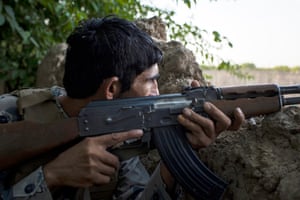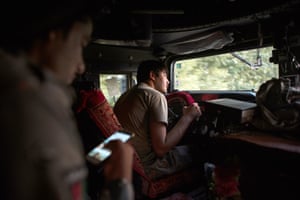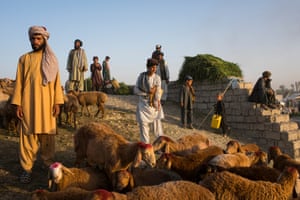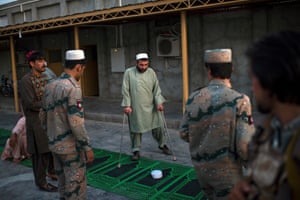Valar Dohaeris
FULL MEMBER

- Joined
- Nov 27, 2016
- Messages
- 1,040
- Reaction score
- 5
- Country
- Location
The Taliban control places like Helmand, where the US and UK troops fought their hardest battles, pushing the drive toward peace and progress into reverse
by Sune Engel Rasmussen in Lashkar Gah
In a rocky graveyard at the edge of Lashkar Gah, a local police commander was digging his sister’s grave.
Her name was Salima, but it was never uttered at her funeral. As is custom in rural Afghanistan, no women attended the ceremony, and of the dozens of men gathered to pay their respects, few had known the deceased.
Salima, like almost all women in Helmand province, had spent most of her life after puberty cloistered in her family home.
Her family said she accidentally shot herself in the face when she came across a Kalashnikov hidden under some blankets while cleaning.
In town – Helmand’s provincial capital – the story was regarded with suspicion, if not surprise. Salima died 10 days before an arranged marriage, but nobody asked any questions: it would be improper to scrutinise a woman’s death.
Her body was lowered into the hole, wrapped in a thin, black shroud. She had lived unseen, and was buried by strangers.
For more than 15 years, women’s empowerment has been claimed as a central pillar of western efforts in Afghanistan. Yet in Helmand, adult women are almost entirely invisible, even in the city. They are the property of their family, and few are able to work or seek higher education, independent medical care or justice.
And if the advancement of women’s rights has moved at a glacial pace in places such as Helmand, the process toward peace has slid backwards. Helmand’s two main towns, Lashkar Gah and Gereshk, are among a handful of places in the province not under Taliban control.
Meanwhile, the Trump administration has yet to define a strategy for Afghanistan.
The US was expected to have approved the deployment of about 4,000 additional troops to Afghanistan by now – the first surge since the withdrawal began in 2011.
Yet the administration is torn. The president himself has wondered aloud “why we’ve been there for 17 years”, and recent reports even suggest that the White House is considering scaling back instead.

An Afghan border police checkpoint on the frontline at Spinah Kota, on the edge of Lashkar Gah, Helmand. Photograph: Andrew Quilty
In Helmand, which is markedly worse off than when foreign combat troops left three years ago, Afghan forces on the frontline are desperate for support. But critics say that more military power only risks fomenting insurgency.
“Even if you kill all the teenagers, the next generation will join the Taliban,” said Abdul Jabbar Qahraman, a former presidential envoy to Helmand. “The insurgency used to be mostly a business. Now it’s also about revenge.”
Afghanistan is America’s longest war, but it is a war America cannot win. And nowhere is this more evident than in Helmand.
Places where British and American troops fought their hardest battles are now firmly under Taliban control.
Babaji, the scene of one of biggest British air assaults in modern times, fell to the Taliban shortly after the Guardian visited last year.
Marjah – where in 2010 thousands of US, British and Afghan troops launched the largest joint offensive in the war – is firmly in the control of the insurgents.
In Musa Qala, the Taliban run a veritable government; in Lashkar Gah, they are close enough to occasionally lob rockets into the governor’s compound.
Prolonged, large-scale battles are rare. Instead, the war is a slow grind of guerrilla attacks, sporadic gun clashes and the occasional push to overrun a population centre. Homemade bombs – the Taliban’s weapon of choice – continue to spread.

Prolonged, large-scale battles are rare. Instead, the war is a slow grind of guerrilla attacks, sporadic gun clashes and the occasional push to overrun a population centre. Photograph: Andrew Quilty
Several provincial capitals remain in government hands only due to US air support. In the first six months of 2017, the coalition released 1,634 weapons, the highest level of air engagement since 2012.
Once in a while, though, government forces win small successes by striking back with their own unconventional methods.
Lounging in the shade of a plum tree at a police base in the town of Spina Kota, Nesar Zendaneh was dressed in black traditional tunic, sporting a thick moustache under curly bangs that partly covered his druggy, bloodshot eyes.
As part of a unit under the National Directorate of Security, Zendaneh and his colleagues dress like local villagers, infiltrate Taliban areas and conduct sneak attacks.
“I don’t hide from them,” said Zendaneh, as small arms fire crackled nearby. “Four months ago, we snuck up on a group of Taliban and fired on them with RPGs. We killed 10 of them; the rest fled.”
In the summer months, the land, green and overgrown, provides bountiful cover for insurgents. Leaving the base in Spina Kota, a police Humvee sped up as it swerved around a bend in the road.

Returning to Lashkar Gah in an armoured humvee from a border police checkpoint on the frontline at Spinah Kota, on the edge of the Helmand provincial capital. Photograph: Andrew Quilty
“This is the most dangerous corner,” said the driver, pointing to a white house behind a single sunflower, about 30 meters (100ft) away. “That’s the Taliban right there.”
Often dispatched to frontlines and remote checkpoints, Afghan police have become so militarised that they rarely engage in actual police work. That makes winning the loyalty of the people even harder.
But foreign troops have relied heavily on the police and other local forces, such as the 1,500-strong militia led by Haji Baz Gul, the first community leader to rise up against the Taliban in Marjah, in 2010.
A mild-mannered elder with a cloud of grey beard and a white skullcap, Baz Gul said western forces had left their Afghan allies in the lurch.
After the long fight for Marjah, the US pulled out too soon, he said, leaving salaries for only one-third of his men. The rest were unable to work in their villages after the Taliban returned; they either fled the region or chose to join the militants.

Farmers and buyers amid flocks of sheep and goats and temporary tea houses at the Friday livestock bazaar in Helmand’s provincial capital, Lashkar Gah. Photograph: Andrew Quilty
“The enemy is at our gates,” Gul said. And the Taliban are not just winning the military battle, but hearts and minds too, he added.
Across Helmand, new mosques are cropping up, funded by private businessmen. Government schools, however, stand empty and decrepit.
“We have 2,000 Taliban madrasahs in Helmand. The government is very weak,” he said.
In a province where the war is being fought between neighbours, the frontline can offer a sense of security. For Maj Ghulam Wali Afghan, the only problem with the frontline, where he has been fighting for 15 years, is how to get there.
As he scooted forward in his chair, two of his men gingerly wiggled the stumps that used to be his legs into a pair of prosthetics. Grabbing one leg each, they clicked his knees into place and helped him stand. Six months ago, the police major sustained his first-ever injury when he stepped on a landmine.

Dusk prayers at a border police base in Lashkar Gar, Helmand’s provincial capital, commanded by Maj Ghulam Wali Afghan, who lost both legs to an IED six months ago. Photograph: Andrew Quilty
“We are tired of fighting,” said Afghan, who commands 330 police. Still, he has nowhere else to go.
Neither does Sardar Mohammad, another police commander, who lost his legs to a mine two years ago. Eleven days later, he was back at the front.
For the men – without formal education, and with no compensation for wounded Afghan veterans – a civilian future holds little promise. At the frontline, they are protected.
“Taliban are my enemy. They can kill me easily. If I leave the job, I will just be at home. Here I have guards,” Mohammad said.
Battle-hardened police commanders such as Afghan and Mohammad have been left to fight the west’s war, but they are not necessarily fuelled by the same ideals of democracy and human rights touted by western leaders and the Kabul government.
The Helmand conflict is highly localised. Mohammad’s enmity with the Taliban began when the Islamists’ regime confiscated his family’s land, and detained and beat his relatives two decades ago. To him, the Taliban’s views on religion, education and women’s role in society are unimportant.
Mohammad’s war is not an ideological one. It is just war.
“We have the same views. We are all Muslims,” he said. Both he and Afghan would welcome more US troops.
“When there are American airplanes and helicopters monitoring in the air, nobody fires at us. When they are not there, we can’t even move one metre without being shot on,” said Mohammad.
Yet neither commander believed military might would end the hostilities. Only a negotiated peace could do that, said Afghan.
“We know from the past 40 years that bullets don’t stop war.”
https://www.theguardian.com/world/2017/aug/03/afghanistan-war-helmand-taliban-us-womens-rights-peace
by Sune Engel Rasmussen in Lashkar Gah
In a rocky graveyard at the edge of Lashkar Gah, a local police commander was digging his sister’s grave.
Her name was Salima, but it was never uttered at her funeral. As is custom in rural Afghanistan, no women attended the ceremony, and of the dozens of men gathered to pay their respects, few had known the deceased.
Salima, like almost all women in Helmand province, had spent most of her life after puberty cloistered in her family home.
Her family said she accidentally shot herself in the face when she came across a Kalashnikov hidden under some blankets while cleaning.
In town – Helmand’s provincial capital – the story was regarded with suspicion, if not surprise. Salima died 10 days before an arranged marriage, but nobody asked any questions: it would be improper to scrutinise a woman’s death.
Her body was lowered into the hole, wrapped in a thin, black shroud. She had lived unseen, and was buried by strangers.
For more than 15 years, women’s empowerment has been claimed as a central pillar of western efforts in Afghanistan. Yet in Helmand, adult women are almost entirely invisible, even in the city. They are the property of their family, and few are able to work or seek higher education, independent medical care or justice.
And if the advancement of women’s rights has moved at a glacial pace in places such as Helmand, the process toward peace has slid backwards. Helmand’s two main towns, Lashkar Gah and Gereshk, are among a handful of places in the province not under Taliban control.
Meanwhile, the Trump administration has yet to define a strategy for Afghanistan.
The US was expected to have approved the deployment of about 4,000 additional troops to Afghanistan by now – the first surge since the withdrawal began in 2011.
Yet the administration is torn. The president himself has wondered aloud “why we’ve been there for 17 years”, and recent reports even suggest that the White House is considering scaling back instead.

An Afghan border police checkpoint on the frontline at Spinah Kota, on the edge of Lashkar Gah, Helmand. Photograph: Andrew Quilty
In Helmand, which is markedly worse off than when foreign combat troops left three years ago, Afghan forces on the frontline are desperate for support. But critics say that more military power only risks fomenting insurgency.
“Even if you kill all the teenagers, the next generation will join the Taliban,” said Abdul Jabbar Qahraman, a former presidential envoy to Helmand. “The insurgency used to be mostly a business. Now it’s also about revenge.”
Afghanistan is America’s longest war, but it is a war America cannot win. And nowhere is this more evident than in Helmand.
Places where British and American troops fought their hardest battles are now firmly under Taliban control.
Babaji, the scene of one of biggest British air assaults in modern times, fell to the Taliban shortly after the Guardian visited last year.
Marjah – where in 2010 thousands of US, British and Afghan troops launched the largest joint offensive in the war – is firmly in the control of the insurgents.
In Musa Qala, the Taliban run a veritable government; in Lashkar Gah, they are close enough to occasionally lob rockets into the governor’s compound.
Prolonged, large-scale battles are rare. Instead, the war is a slow grind of guerrilla attacks, sporadic gun clashes and the occasional push to overrun a population centre. Homemade bombs – the Taliban’s weapon of choice – continue to spread.

Prolonged, large-scale battles are rare. Instead, the war is a slow grind of guerrilla attacks, sporadic gun clashes and the occasional push to overrun a population centre. Photograph: Andrew Quilty
Several provincial capitals remain in government hands only due to US air support. In the first six months of 2017, the coalition released 1,634 weapons, the highest level of air engagement since 2012.
Once in a while, though, government forces win small successes by striking back with their own unconventional methods.
Lounging in the shade of a plum tree at a police base in the town of Spina Kota, Nesar Zendaneh was dressed in black traditional tunic, sporting a thick moustache under curly bangs that partly covered his druggy, bloodshot eyes.
As part of a unit under the National Directorate of Security, Zendaneh and his colleagues dress like local villagers, infiltrate Taliban areas and conduct sneak attacks.
“I don’t hide from them,” said Zendaneh, as small arms fire crackled nearby. “Four months ago, we snuck up on a group of Taliban and fired on them with RPGs. We killed 10 of them; the rest fled.”
In the summer months, the land, green and overgrown, provides bountiful cover for insurgents. Leaving the base in Spina Kota, a police Humvee sped up as it swerved around a bend in the road.

Returning to Lashkar Gah in an armoured humvee from a border police checkpoint on the frontline at Spinah Kota, on the edge of the Helmand provincial capital. Photograph: Andrew Quilty
“This is the most dangerous corner,” said the driver, pointing to a white house behind a single sunflower, about 30 meters (100ft) away. “That’s the Taliban right there.”
Often dispatched to frontlines and remote checkpoints, Afghan police have become so militarised that they rarely engage in actual police work. That makes winning the loyalty of the people even harder.
But foreign troops have relied heavily on the police and other local forces, such as the 1,500-strong militia led by Haji Baz Gul, the first community leader to rise up against the Taliban in Marjah, in 2010.
A mild-mannered elder with a cloud of grey beard and a white skullcap, Baz Gul said western forces had left their Afghan allies in the lurch.
After the long fight for Marjah, the US pulled out too soon, he said, leaving salaries for only one-third of his men. The rest were unable to work in their villages after the Taliban returned; they either fled the region or chose to join the militants.

Farmers and buyers amid flocks of sheep and goats and temporary tea houses at the Friday livestock bazaar in Helmand’s provincial capital, Lashkar Gah. Photograph: Andrew Quilty
“The enemy is at our gates,” Gul said. And the Taliban are not just winning the military battle, but hearts and minds too, he added.
Across Helmand, new mosques are cropping up, funded by private businessmen. Government schools, however, stand empty and decrepit.
“We have 2,000 Taliban madrasahs in Helmand. The government is very weak,” he said.
In a province where the war is being fought between neighbours, the frontline can offer a sense of security. For Maj Ghulam Wali Afghan, the only problem with the frontline, where he has been fighting for 15 years, is how to get there.
As he scooted forward in his chair, two of his men gingerly wiggled the stumps that used to be his legs into a pair of prosthetics. Grabbing one leg each, they clicked his knees into place and helped him stand. Six months ago, the police major sustained his first-ever injury when he stepped on a landmine.

Dusk prayers at a border police base in Lashkar Gar, Helmand’s provincial capital, commanded by Maj Ghulam Wali Afghan, who lost both legs to an IED six months ago. Photograph: Andrew Quilty
“We are tired of fighting,” said Afghan, who commands 330 police. Still, he has nowhere else to go.
Neither does Sardar Mohammad, another police commander, who lost his legs to a mine two years ago. Eleven days later, he was back at the front.
For the men – without formal education, and with no compensation for wounded Afghan veterans – a civilian future holds little promise. At the frontline, they are protected.
“Taliban are my enemy. They can kill me easily. If I leave the job, I will just be at home. Here I have guards,” Mohammad said.
Battle-hardened police commanders such as Afghan and Mohammad have been left to fight the west’s war, but they are not necessarily fuelled by the same ideals of democracy and human rights touted by western leaders and the Kabul government.
The Helmand conflict is highly localised. Mohammad’s enmity with the Taliban began when the Islamists’ regime confiscated his family’s land, and detained and beat his relatives two decades ago. To him, the Taliban’s views on religion, education and women’s role in society are unimportant.
Mohammad’s war is not an ideological one. It is just war.
“We have the same views. We are all Muslims,” he said. Both he and Afghan would welcome more US troops.
“When there are American airplanes and helicopters monitoring in the air, nobody fires at us. When they are not there, we can’t even move one metre without being shot on,” said Mohammad.
Yet neither commander believed military might would end the hostilities. Only a negotiated peace could do that, said Afghan.
“We know from the past 40 years that bullets don’t stop war.”
https://www.theguardian.com/world/2017/aug/03/afghanistan-war-helmand-taliban-us-womens-rights-peace





